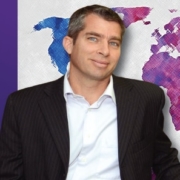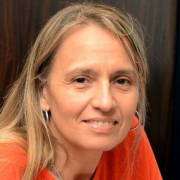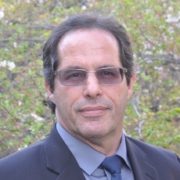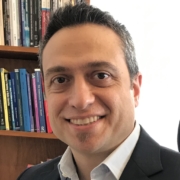Today: global citizenship education.
What is global citizenship education and how is it practiced?
And what is the relationship between national citizenship and global citizenship? Are they compatible?
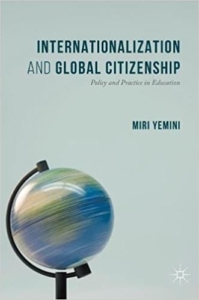
My guest today is Miri Yemini, an Honorary Visiting Lecturer at the Institute of Education at University College London and a Lecturer in the School of Education at Tel Aviv University
She has recently published a book entitled Internationalization and Global Citizenship in Education.
Citation: Yemini, Miri, interview with Will Brehm, FreshEd, 76, podcast audio, June 5, 2017. https://www.freshedpodcast.com/miriyemini/
Transcript, Translation, Resources:
Will Brehm 1:27
Miri Yemini, welcome to FreshEd.
Miri Yemini 1:29
Thank you for having me here.
Will Brehm 1:31
Could you tell me what exactly is global citizenship education?
Miri Yemini 1:34
I think that the main difficulty in conceptualization of global citizenship education is that it is usually defined by different stakeholders, and those are aiming to implement it or to investigate it for different area of reasons. And I think the implementation of global citizenship education is usually kind of defined what global citizenship education will be about eventually. There are many typologies that define global citizenship education, and I think that most of those typologies are looking at two or maybe three basic definitions of GC – or global citizenship – education. So, one would be relating to how an individual would refer to the larger society and to the ultimate other, including empathy, environmental issue, human rights issues. The second one would be more of economic and, you may say, neoliberal in a nature, where GC would referred as some kind of quality or a skill that needed to succeed and survive in the 21st century. And maybe the last one or basic typology would look very critically into the whole existing both research and policy of GC and kind of define it as Westernized and very much in just a way and suggesting more postcolonial and more critical definition of it, where one should be defined or redefined within the broader environment. I think that most of those critical stances related to the deep existing inequalities in North-South relations and the existing dominance in the world, but also in education, and thus the third path would be probably more advocated by scholars that actually try to kind of comply with the area of existing definitions.
Will Brehm 4:08
So how is global citizenship education in these different conceptualizations that you just laid out, how are these different than national citizenship?
Miri Yemini 4:19
Well, I think that one basic question to ask here before I can answer this is whether global citizenship education actually exists as national citizenship is legal and normalized definition of one belonging to a specific nation with the responsibilities and acts that one can perform and can act and can live within. Well, there is no global government and no global borders. So, once we look at GC as something that is not legal or strict, we can say that this would be the first very prominent difference between those two. So, between the legal and very narrow definition of national citizenship where you have rules and every government basically define who can be citizen and who will be excluded or included in that definition, global citizenship might be more of a voluntary kind where one would decide whether he or she belongs or reflect on that definition or not. Additional issue that might be taken into account here is that global citizenship is more speaked of in a Western world, including explicit Western assumptions on the, for example, geographical mobility of the individuals, or on specific resources and assets that one may need in order to participate in this global citizenship debate, while national citizens are usually born into specific situation where they belong or excluded or included within.
Will Brehm 6:31
Why would national governments incorporate global citizenship education into their national curricula?
Miri Yemini 6:38
Well, this is a good question and it seems that, first of all, are they incorporating global citizenship education? When we look at the specific countries and studies that try to kind of research global citizenship education in different countries, we can see that not many of them are pursuing global citizenship education. Those who do, they usually have different reasons for that. For example, some of the places, say U.K. or Canada, you can see that these might be under the extracurricular activities that specific external bodies within the country governance pursuing order to add specific agenda. Sometimes it will be related to diversity, human rights, cosmopolitanism. Another set of rationales that national governments may have relates to the competitive part of global citizenship. Under those circumstances, those governments would pursue more of 21st century skills like GC. They would look into how one future citizen would be more competitive, more globally oriented. And global citizenship education being so broad in terms of the definition and in terms of how one can become such a citizen is actually fits to many different, sometimes conflicting, agenda. And can be kind of gathered under this broad umbrella of global citizenship.
Will Brehm 8:50
Could you give an example of that?
Miri Yemini 8:53
Well, we can see, for example, studies from South Korea where global citizenship is used to enhance competitive stances of the future citizens. You can see similar values may be called more as “global inclination” or “global mindedness” in China, in Singapore. On the other hand, for example, in U.S., global citizenship was, although not very well developed, but when it is appears, it would be more of how the American citizens would save their superiority in the world and how they would be more competitive. On the other hand, in Canada, global citizenship studies show that this term would used in order to increase multicultural and multinational stances of the students and the way to kind of create integration and solidarity among the Pacific nationals in this case of Canada. So, it’s really diverse. And it can be implemented in different ways. That’s why this implementation is so critical, has so many critiques that encountered by the researchers around the world. And since, as we said, no exact definition exists, or no agreed definition exists at least, we might think that each one of those stakeholders can be satisfied with how the global citizenship is pursued and implemented in their country.
Will Brehm 10:49
What are some of these gaps between the academic literature and these definitions of global citizenship education and these diverse practices that have very different expected outcomes of global citizenship education? What sort of gaps do you see when you read the literature and analyze the actual practices?
Miri Yemini 11:12
So, one example of such a gap is that researchers seems to discuss global citizenship as a more accepted and more normalized state of society, of curricula. But policymakers, and especially teachers and educators within schools, seem to have much more reservation about this notion. And many studies, especially in specific context of conflict or post-conflict societies, they show that despite the attempt of the government to increase global citizenship education, the teachers tend to avoid use of this particular term and of the whole issue of global citizenship. Another gap involves the widespread call for more critical global citizenship education as expressed in theoretical research, such as of Vanessa Andreotti and others, in contrast to the continued lack of, sort of critical discussions within actual policy. Similarly, GC is often related to peace education and proactive advocacy. And what I show from my analysis of research is that in each region, or in each country, if you would, it’s adapted to fit local needs and not some kind of ultimate global goal, thus pushing aside most of the issues concerning any sort of cosmopolitan ethics, if you wish.
Will Brehm 13:10
Right, it sounds like global citizenship education is a term that can have so many different meanings and so many different practices that it ultimately will, it depends on the local context and how it’s going to be appropriated and used. Could you talk a little bit more about this idea of the critical stance about global citizenship education? You said it appears in the literature quite heavily, but does it actually exist in practice? Are there places that are teaching a more critical stance of global citizenship education and questioning the Western notions that are tied up inside global citizenship education?
Miri Yemini 13:51
I would say that most of the programs, and most of the studies regarding those programs that I encountered, weren’t very critical, nor in their theoretical standing neither in the implementation of the studies. I would guess that the dominant pathway to teach global citizenship education is rather not-critical. But nevertheless, perhaps individual teachers and individual educators, again maybe more in higher education sector, do engage with those critical stances. And again, being critical is a nice thing, but I think that ultimate global citizenship education will require not only taking some kind of critical standing point, but also actually being active and proactive within this sphere. So, for example, you can find a lot of studies addressing, assessing actually different study abroad or volunteering programs where students are encouraged to volunteer – usually North atmosphere students going to low income countries where they can kind of use their “do-gooder” skills to enhance their own skills and their own conditions in the workplace or in higher education. And those kind of studies really show how global citizenship can be used for “do-goodery” only and not being really transformative act that will change these existing hegemonic relationships between countries, between individuals, between nations. Nevertheless, I see – and I meet a lot of teachers and educators, especially in my field research in this area – that individually and usually as an voiced opposition to the written curriculum do present very much critical stances and teach students those existing state of art, but also questioning it permanently and providing a fresh and sometimes really highly contested political global citizenship education.
Will Brehm 16:52
So, for example, would this be something like going on a service trip abroad as part of your schooling experience during say, your spring break, and you live in, say, America or Canada, and you end up going to a country in Africa for a week. And you are helping a local community build a school, or maybe you’re teaching some English classes, you’re saying that the critical side of that would be to actually start trying to address some of these structural power relations that are inherent in that. That the difference between the American or Canadian school and the school in Africa, instead of just doing and thinking you’re doing this “do-gooder” sort of aspect and therefore I’m becoming a global citizen.
Miri Yemini 17:40
Right. This issue of volunteering in low income countries has been criticized for a long time now, not even relating to global citizenship education. But if I would be teaching those students, I would ask, for example: Why in the first place there are less resources in those countries? And I would go back to the colonial relations that have been existing for centuries between those countries. I would ask what will happen when this program will end, and who will invest additional resources in this new build school? And what kind of message those children in this school will receive about their autonomy, their ability to change their own reality, about them being agents of their own fate instead of being just receivers of this foreign aid, which can come from really noble motives. But nevertheless, eventually, in many cases, if we just had the local community and would decrease their own ability to solve their own problems, which many times, by the way, caused by those existing hegemonic relations in the first place.
Will Brehm 19:18
So global citizenship education, is it a global phenomenon in the sense that it’s being incorporated into curricula around the world? Or is it predominantly happening, maybe not just around the world, but also in terms of class? Is it being incorporated into schools around the world that are the private, privileged classes, or do we see these curricula being incorporated into all levels of schooling around the whole world?
Miri Yemini 19:47
Well, there has been several studies that tried to track the rise in the mentions in the global citizenship education related concepts, including diversity, human rights, cosmopolitanism. For example, Patricia Bromley showed that there is a global rise all over the world in the mentions of GC related context. Yet, studies of individual countries and comparative studies in small number of countries demonstrated that the inclusion of GC in education policy and curricula is often framed in terms of the particular benefit of the specific situation. So, for example, in Northern Ireland, global citizenship is described as form of peace education. So, there would be all population kind of exposed to those concept of promoting tolerance and offering framework dealing with diversity, maybe. Canadian multiculturalism provides another example of this contextual factor, where all students would be exposed to GC into their curriculum. But I would say that it’s not a matter maybe of formal curriculum where specific classes would be restricted to their attitude towards global citizenship education, but it’s more a matter of implementation. And in our studies in Israel, me and Heela Goren, a student of mine, showed how teachers themselves perceived that different students would be more acceptable to this concept of global citizenship education. And it’s not that teachers in our study showed that global citizenship would be suitable only for the better off. They would claim that global citizenship is much needed to all kinds of schools and all kinds of pupils. But in the realm of schooling, we show that eventually the teachers, and even the students themselves, perceive global citizenship education as more of elite nature. And especially teachers perceived GC as being something that students of higher socioeconomical status would be more exposed to and more aligned with – with its terms, goals for key or desired outcomes. In that case, especially when you don’t have the specific curriculum, specific policy, better off students would get much more exposure to those terms eventually, and their ability to be geographically mobile, and to maybe on better language – better English language for the sake of discussion skills would posit them in a much better position in the workplace and in their future life. Having said that, globalization, at least until recent political phenomena, was kind of spreading together with physical and virtual mobility.
Will Brehm 23:26
It makes me wonder if there’s been any discussion or implementation of global citizenship education in schools or in areas that have seen large numbers of refugees, particularly in Europe, I’m guessing. But also, in the Middle East as well. It seems like the refugee crisis has been forced mobility in some senses, and it seems like global citizenship education could be used in some way to address some of these issues. But if you’re saying that it’s been perceived as benefiting only a certain class of people, it seems like there may be a disconnect when it comes to refugee education.
Miri Yemini 24:09
Right. I think this is a good point to make as this increased diversity and the reasons and the nature of geographic mobility is probably the most interesting issue to examine. So if global citizenship can, in theory, serve as alternative citizenship mode that can be much rather inclusive for different kinds of people, or in specific example of refugees, of children of different nationalities, instead of being taught towards specific national citizenship, they, in principle, could be engaged under this broader concept of global citizenship education. I must say that except from the research of Sarah Dryden-Peterson from Harvard, who is looking at global citizenship within refugee education, there is no much research on that. And maybe since inclusion of refugees within schools is quite recent phenomena on the large scale, and sometimes those refugees are being incorporated within schools serving lower socioeconomical class, and then maybe their global citizenship education would not be arising as a main value. I would say that this issue needs more research. And also, it needs some experiments and attempt to implement, but it seems rather promising concept to deal with the main kind of aim of schooling, which was traditionally to socialize the youth under the flag, the language and the values of specific nation. And now, when the world is so much more mobile and some of those mobilities are forced you to war and different individual circumstances, global citizenship education might enter this arena and create a positive way to deal with those power relations embedded within existing schooling.
Will Brehm 26:42
So, before we go, I just want to ask, would you consider yourself a global citizen?
Miri Yemini 26:47
Well, I guess I would consider myself not connected to any of the countries that I was residing in. Well, I was born in Russia and immigrated with my family to Israel, and now I live in London. I think that I find very much sense in global citizenship as an alternative model of human identity, but I think that it’s not enough done, and I’m among those people who probably could do more in order to make this model a viable alternative, maybe, for the human being to adhere to.
Will Brehm 27:33
Well, Miri Yemini, thanks so much for joining FreshEd. It was really great to talk today.
Miri Yemini 27:38
Thank you.
Exploring global citizenship education



